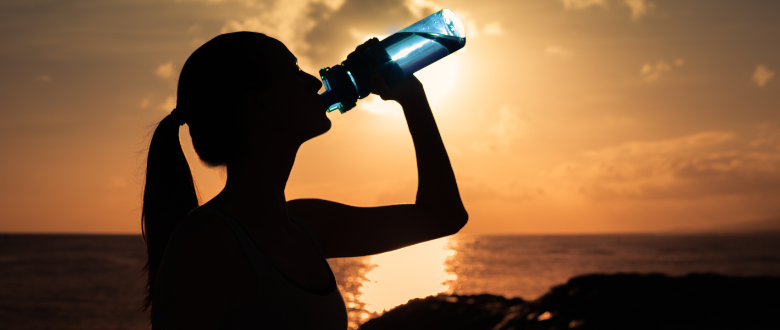The benefit of staying hydrated is that it can help you exercise longer, perform better in workouts and races, have less muscle soreness after training sessions, or even prevent dehydration. What most people don’t know though are the risks involved with drinking too much water which could lead to Dehydration (75% drawn from muscles) AND sanctioned drinks being boring as hell!
The key thing here: drink plenty before starting any workout so your body has enough fluids available during the activity.
1. Should you drink water during a workout?
The American Council on Exercise recommends drinking water during your workout to prevent dehydration. Sweating, increasing heart rate and burning calories all lead us towards needing more fluids than usual in our bodies!
A good rule-of-thumb is 7 - 10 ounces every 20 minutes while working out so you don't feel thirsty or have any other issues with being puffy afterwards.
While exercising, it’s important to drink enough water so that you don't lose any of your muscle mass. However, if the environment is hot or humid and there's little chance for a break in order--for example running marathons where distances can be long-lasting between drinks—then beverage choice becomes more relevant because carbohydrates are needed also an electrolyte mineral mix which helps replace what was used up during exercise.
2. How much water should you drink during a workout?
There are a couple of goals when it comes to drinking water throughout your exercise routine. The first is preventing dehydration and the second goal should be not to drink more than what you’re sweating out during workouts, so weighing yourself without clothes before and after will help with determining how much H2O intake may need in order to maintain weight stability while working out!
To avoid that from happening in the first place, it is recommended you drink 17-20 ounces of water two to three hours before a workout. Then about 20 minutes beforehand drink another 8-ounce glass and continue with 16 -24 more after completing your routine for each pound lost during workouts so as not to have any ill effects on Performance!
3. Post workout hydration
There is a common misconception that you must drink lots of water during exercise. This can lead people into thinking they are going to melt if their activity lasts longer than an hour or involves hot weather, but it's actually possible for most individuals without excessive sweating and humidity levels in the air (elevated thermal Stress). The average person produces about 32 ounces per minute while exercising indoors; this amount could be too much depending on how fit they usually spend time outside working up quite some sweat!
We all know the importance of hydration, but did you also realize that it can be a quick and easy way to tell if your body needs more water? examination your urine before class will give light or dark yellow coloration depending on how much fluid washes out during exercise. A clear start with only small amounts being produced shows there's room for improvement - drink throughout any type stay at home workout routine!
4. Don’t forget to drink your water
Whether you’re doing a one-hour workout or an entire marathon, staying hydrated throughout the exercise is key to performing at your best. Before starting any type of activity make sure that water has been drinking for both during and after workouts by following this daily recommended amount guidelines based on gender (water counts too!). If it's possible avoid sipping in class if thirsty since taking drinks from cups might be distracting but usually people can go without drinking when working out because sweat does most work!
Drink when thirsty! Sip slowly and take deep breaths, your body will let you know if its time for a drink.

